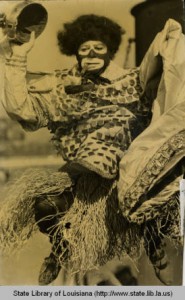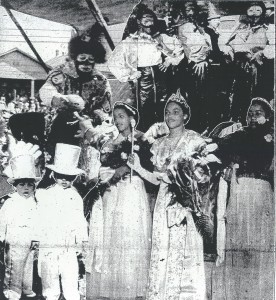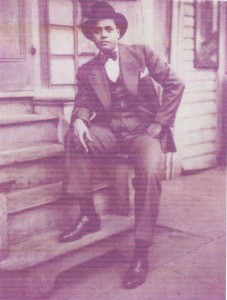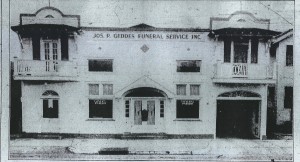[King Leopold LeBlanc Jumping for Joy ]
An editorial written in The Louisiana Weekly just one week prior to Carnival festivities of 1934, gave great advice to all New Orleanians. The public was warned and cautioned that even though the word “carnival” means “goodbye to the flesh” it does not mean goodbye to reason and caution.
The editorial stated… “It is sad indeed to reflect that our former Carnival celebrations have been marked by entirely too much bloodshed. Too many heads have been cracked; too many fist fights; too many brawls; too many big bad Indians have gone on the warpath on previous Carnival days. And what makes the picture all the more somber is the fights and the killings have usually been among our people. Carnival is the day of all days when we should have our Sunday conduct on exhibition, for on that day the whole nation is watching our steps. So let us go out on Carnival day to have a jolly good time, but let us have that good time by being careful to keep off the other fellow’s toes and thereby avoiding a fight or worse.”
[Leopold LeBlanc -King Zulu 1938]
Leopold LeBlanc was King Zulu that year of 1934 as well as 1938. No longer did his costume consist of a lard can crown, raggedy pants and a banana stalk scepter as previous kings (1909-1914) had worn. The year 1915 heralded the first use of floats which were constructed on a spring wagon, using dry good boxes and decorated with palmetto leaves and moss. This humble beginning gave rise to the lavish floats we see in the Zulu parade today.
When King Leopold landed at the New Basin Canal that Tuesday, 13 February 1934, he was met by his queen, Mrs. Virginia Costin and her royal court. He mounted the first of only three floats and led the entire Zulu parade onto the streets where thousands of spectators waited to greet him. To see the Zulu parade, you had to travel the so-called “back streets” of the Black neighborhoods. The segregation laws of this period and Zulu tradition demanded that this was so.
Stops along the Zulu parade route in 1934 were made at Paradise Beer Garden, Cracker Jack Drug Store, City Hall, Belfield’s Pharmacy and Snowflake Beer Parlor at 1614 Orleans Avenue. After the parade, the royal court was entertained at a dance held at the Astoria Hotel on South Rampart Street.
[Edmond Hewlett -King Zulu 1936]
Two years later, 1936, Edmond Hewlett was crowned king. When he arrived at the New Basin Canal, in the midst of whistles and the roar of guns, thousands of his loyal subjects congregated to cheer him on. According to an article (LA Weekly 15 Feb.1936) King Hewlett arrived aboard the royal yacht, S.M.S Claribel, loaded with valuables which he would distribute to the public. He brought with him gold, diamonds, and coconuts from various African ports. Brandy, cognac, choice whiskies and wines came from Bordeaux, France as well as favors from Barcelona for the ladies. King Hewlett was soon on his way leading a total of three floats which depicted a native hut with aborigines ascending and descending stairs, a huge python showing its fangs to warriors seated in a winged chariot, and head hunters whose shoulders were adorned with the manes of lions and tigers taken while in battle.
Stops were made along the parade route. The first being at Geddes &Moss Undertaking Parlor where King Hewlett was greeted by his queen, Miss Regina Brooks and her court. King Hewlett drank a toast made to Emperor Haile Selassie while Mrs. Gertrude Geddes Willis acted as a hostess at the luncheon. Here, Dr. T.R. Williams presented the king with a key to the city and Miss Josephine Smith (1935 Queen) escorted the group to lunch.
[Joseph P. Geddes Funeral service, Inc 1936]
Stops were also made at City Hall, Belfield’s Pharmacy, and Monte’s Liquor Store & Bar on Washington and Magnolia. Neighborhood liquor stores, such as Monte’s, sponsored certain floats and consequently, the floats were obligated to pass there. Passing meant stopping, as the bars/ liquor stores advertised that the “Zulus will stop here!” Once stopped at a sponsoring bar, it was often difficult to get the riders out of the establishment, so the other floats took off in different directions to fulfill their obligations.
Monte’s Liquor Store, not only advertised that King Hewlett would be their honored guest, but also that 1500 prizes would be distributed to the best maskers, impersonators and imitators on Mardi Gras Day. Three judges would be on hand to select the winners while customers browse the full stock of choice liquors which Monte’s sells for less than its competitors.
After the parade, the king and his party were entertained with a dance held at the Roseland Dance Hall. By 12 midnight, all activities ceased and preparations for the solemn season of Lent began.
Sources: The Louisiana Weekly 10 Feb. 1934 p.8; 22 Feb. 1936 p.1&5; 29 Feb. 1936 p. 2; 05 Mar. 1938 p.1; www.kreweofzulu.com/history
L.V.C







It was heartening to see the sense of community and good will shown by the newspaper in 1930 and to applaude Mr. LeBlanc’s effort to improve the image of that proud African tribe, the Zulus, that year and recognizing the impact of demeaning images of African Americans as they were in the world spotlight. Is it not time for the group to further evolve and to stop perpetuating the negative stereotypes and images in the world spotlight of Africans as they were portrayed in movies of those times?
Hi!
My name is Kelly Dorsey-Parker, a local writer working on a book project on black carnival queens.
I’d love to share some of the stories of early Zulu royalty. If anyone has relatives that were former Zulu queens–that might be interested in taking part in the project, please forward contact information, and I’ll follow though.
Thanks!
My cousins are Hewletts. I sent this article to them,
Hi, I’d like to contact Kelly Parker regarding queens of Zulu, in particular the earlier years. I have been researching them.
Hi Jerry!
I hope this response finds you!
My email address is
write4u2022@gmail.com
Would love to talk to you about any info you have on early Zulu queens!